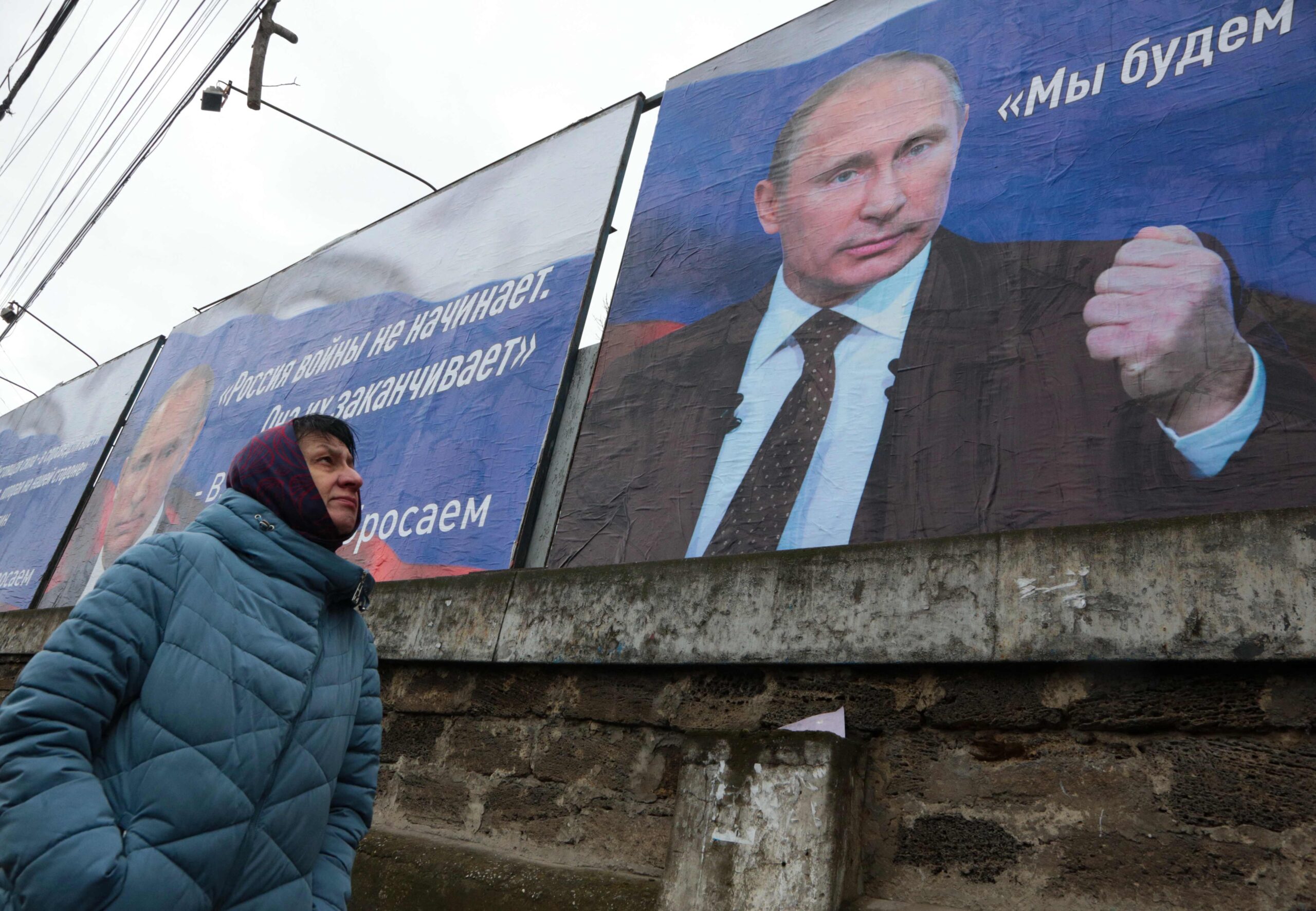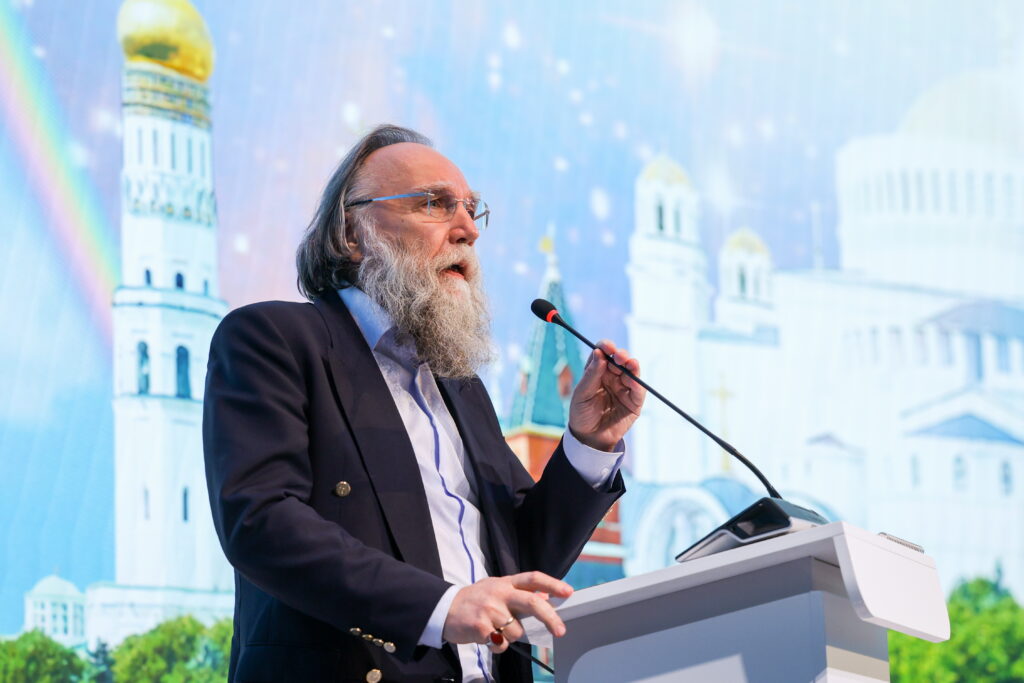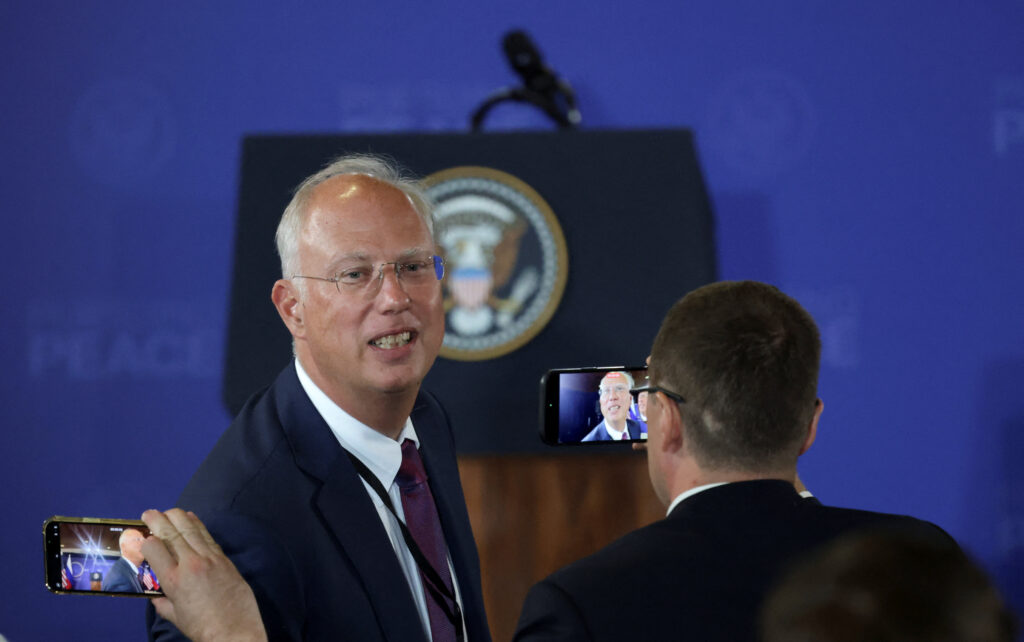Putin’s propaganda is breaking records of effectiveness. Monstrosities and atrocities, such as an attack against another country, killings, torture, arrests for using specific words (sometimes even a single word: ‘war’) and hatred incited in society, are presented as the salvation of Russia, and indeed of the entire ‘Russian world’. Unfortunately, people believe it.
All of Putin’s speeches represent a collection of rhetorical and discursive devices that have been already tried and tested by other dictators (from Hitler to Gaddafi, Mubarak, Saddam Hussein and others). Despite its apparent diversity, their language boils down to a few recurring and rather simple linguistic techniques.
Absolutism of values
One of the first signals that a regime is leaning towards a dictatorship is the emergence of a ‘value-based discourse’ at the official state level.
Undoubtedly, many leaders in democracies also talk about values since this is a sensitive topic for any society. However, this kind of discourse in dictatorships is primarily designed to prepare the public for sacrifice and deprivation in the name of their country and leader (the leader, the country and the state are symbolically unified). Therefore, values are mentioned exclusively in the patriotic context. In fact, patriotism is declared to be the main value. It is interpreted as loyalty and devotion to the motherland and readiness to defend the country (i.e. its leader) at the expense of people’s lives.
The dictatorial discourse is characterised by absolutism of values. The people are proclaimed to be the sole bearer of certain unique values which are the only ‘right’ values. Their ‘rightness’ is justified either by referring to their ‘historical roots’ or the fact that they are pleasing to God, or both. For example, every speech by Saddam Hussein was filled with references to «the great values of the glorious past» that «please Allah.»
Putin also justifies the values he proclaims by referring to their long history: «We must fully support the institutions which are the bearers of traditional values, and which have historically proved their ability to pass them on from one generation to another.»
At the same time, the values professed by the ‘Other’ are presented as harmful and dangerous. As Putin remarked when speaking of Western values on 24 February 2022, those values «lead to degradation and degeneration since they contradict the human nature.» At the same time, the dictatorial discourse as a whole is built on the confrontation of the self and the enemy, which is why values are also represented within the rhetoric of threats. Values come across as the main object of enemy’s attacks whereas the leader acts as their main defender, protecting the values not only within the country, but also at the global level. Back in 2013, Putin defined Russia as «a country that consistently defends its values, also in international relations.»
Further, as regimes evolve towards dictatorship, the value-based discourse becomes ever more radical. In Putin’s speeches, the theme of values, morality and ethics has been clearly evident since 2005. In most cases, values are represented through words such as ‘patriotism’, ‘distinctiveness’, ‘responsibility towards the country’ and ‘moral integrity’. In July 2021, the value-based discourse was finally institutionalised as its key tenets were enshrined in the National Security Strategy of the Russian Federation. Traditional values were included among the targets in the context of national security and their protection became the responsibility not only of the Ministry of Culture but also the Federal Security Service, the Investigative Committee, the Prosecutor’s Office and the Foreign Intelligence Agency.
An obsession with history
Another clear sign that a regime is sliding into a dictatorship is the head of state’s sudden ‘in-depth interest’ in history and, consequently, in rewriting it. All dictators seek to monopolise history and shape their own historical narrative. Some do not simply delegate this task to the propaganda machine, but embark on it themselves by publishing historical articles and giving lectures.
One striking example is Saddam Hussein, who, forestalling Putin, closely linked the existence of a nation with the preservation of history: «To our nation and people, history is not merely a register of contextual activities. It is rather a record of sacrifices made in blood in order for the nation to preserve its qualities and maintain its role, and in order for our people as well to remain as such.» Hussein gave lectures on the role of the Iraqi armed forces in the Arab-Israeli conflict (e.g. at the Al-Bakr University).
In recent years, Putin has also taken an extreme interest in history. In July 2021, his article entitled «On the historical unity of Russians and Ukrainians» appeared on the Kremlin’s website, and he repeated its main idea in his infamous address to the Russians on 21 February 2022.
Manipulation of history helps dictators to justify pretty much anything. This discursive device is trusted by the public because the arguments are based on the well-established stereotype that it is important to follow history. Few people wonder whether the claims are consistent with actual historical data. This is partly caused by ignorance, and partly because the historical narratives constructed by the speaker fuel the sense of national pride and a sense of belonging to something great.
The rhetoric of threats
The rhetoric of threats and the dominant theme of an external enemy is an obligatory and the most striking feature of any dictatorial discourse. A dictatorial regime sees everything as an outside threat and presents all of its own actions, even aggression against other countries, as defensive measures.
For instance, Hitler ‘fought the global evil’ of capitalism and Bolshevism, which, in his interpretation, were epitomised by the Jews. During Gaddafi’s first decades in power, imperialism was the enemy, represented by the USA and the USSR. However, this did not prevent Gaddafi from engaging with the USA, UK and the EU later on, although he maintained the anti-Western rhetoric. Mubarak also fought against the West that allegedly attempted to «spread chaos and violence, confrontation and to violate the constitutional legitimacy and to attack it.»
Saddam Hussein justified the invasions of Iran in 1980 and Kuwait in 1990 by saying that these countries were actually expressing U.S. interests, and the United States was allegedly seeking to destroy Iraq. He pointed out that there was no difference between the behaviour of Iran and of the United States. Accordingly, it was a war against a country that was hostile to Iraq. And if Iraq does not attack first, then the USA, represented by Iran, would attack Iraq.
When reading Hussein’s speeches, one cannot but wonder that perhaps Putin took inspiration from this Iraqi leader. Let is compare: «Today’s events have nothing to do with a desire to infringe on the interests of Ukraine and the Ukrainian people. They are meant to protect Russia from those who have taken Ukraine hostage [meaning: the USA] and are trying to use it against our country and our people. I repeat: our actions are taken in self-defence against the threats posed to us and against an even greater calamity than what is happening today.»
Syndrome of grandeur
All dictators claim that their country pursues a lofty mission and epitomise greatness. However, when they say ‘country’, they mean themselves, fully identifying with it. Let us leave Hitler aside, with his idea of the superiority of the Aryan race, and look at figures from less distant past.
Gaddafi aspired to global greatness by calling Libya «the mother of all peoples» and proclaimed that Libya would lead the Arab world first, and later also the rest of Africa, and his regime would become a model for other countries. Saddam Hussein was ‘saving’ not only Iraq, but ‘all humanity’ while Mubarak ‘fought’ for human freedom and dignity, justice, equality and, of course, for family values (much like Hussein).
Back in 2013, Putin proclaimed Russia as virtually the last stronghold of traditional values, which, as Constitutional Court Chairman Valery Zorkin later explained, were true European values. Thus, according to Putin’s vision, he is saving not just Russia, but the entire European civilisation and the entire world from the ‘global domination’ of the West, which leaves «bloody, non-healing wounds behind, alongside the plagues of international terrorism and extremism» «almost everywhere, in many regions of the world, where it comes to establish its order.»
All of this pathos-filled rhetoric about the struggle for people’s survival, garnished with loud and attention-grabbing words about courage and heroism, is instrumental in covering up the real picture. With these words, the killings, torture and rape of civilians are pushed out of the view of common folks, and the regime’s repressive machine prevents competing discourses from gaining a foothold.
In his greetings to women on International Women’s Day (8 March), Putin addressed «the mothers, wives, sisters, fiancées and girlfriends of soldiers and officers who are now in combat, defending Russia»: «You can be proud of them and so is the whole country, which is proud and worries about them together with you.» The word «proud» covers up military death notices, grief, tears and the corpses of these soldiers.
Unity and enemies of the people
Dictators will always repeat that the people are united and supportive of their power and policies. Gaddafi, for example, kept repeating that he enjoyed the support of millions, both at home and abroad. And millions were allegedly ready to follow him.
In his 2014 address to the Federal Assembly, Putin noted the «unity of the nation» and said that Russia was only able to protect its compatriots thanks to Russian citizens: «thanks to your work and the results we have achieved together, thanks to your profound understanding of the meaning and significance of national interests. We have understood the inseparability and integrity of our Fatherland’s thousand-year-long journey. And we believe in ourselves, we believe we can achieve a lot and we will achieve it.» This narrative of the people’s profound understanding of the meaning and significance of national interests (as understood by Putin) and unity with the president’s policies is regularly reproduced in his speeches.
However, in reality, dictators do their utmost to keep the society fragmented and disintegrated. Gaddafi, for example, used tribal divisions to his advantage and supported tribalism. Stalin introduced the famous notion of the «enemy of the nation.» Putin’s Russia has long seen internal divides within society: the fifth column, foreign agents, national traitors, etc.
«They give them pills. It’s not their own will»
Dictators have been forcing the idea that the people will never come out to protest out of their own free will, and that protests that do take place are provoked solely by the enemy, the West. At the same time, protesters’ actions are said to destroy the country from within.
When speaking of protesters, Gaddafi said: «These are the people behind them. They give them pills, it’s not their own will.» In Russian discourse, «pills» have been replaced by «State Department’s biscuits,» but all other things remained unchanged. Mubarak argued that the young people who took to the streets to protest and demand his departure were being «quickly exploited by those who sought to spread chaos and violence, confrontation, and to violate the constitutional legitimacy and to attack it.» In 2020, Lukashenko very precisely echoed the words of the Egyptian leader, claiming that the West was manipulating the young protesters to destroy Belarus.
During the protests in support of Navalny in January 2021, Putin responded by saying that «anything that goes beyond the law is not just counterproductive, it is dangerous. In the history of our country, we repeatedly encountered cases when the situation (…) led to such a swaying of society and the state that affected not only those who swayed the state and society, but also those who had nothing to do with it.»
This parade of quotations with identical meaning can be continued endlessly. All dictators use the same patterns of argumentation. There are many more characteristics that can be highlighted, but once politicians have begun to use any of the techniques described above, it is time to raise the alarm.
Democracies may also see politicians who use elements of dictators’ language. However, the open information space prevents such rhetoric from becoming hegemonic. In turn, dictatorships cut off almost all channels of competing discourses that could debunk manipulation. And while sometimes people are willing to speak out openly against the autocrat even in the most austere dictatorships, their voices are drowned by the streams of official propaganda. Moreover, these individuals or groups are already labelled as ‘traitors’ by the regime, i.e. they are marginalised in the eyes of the public, which deprives them of credibility vis-à-vis their compatriots.









